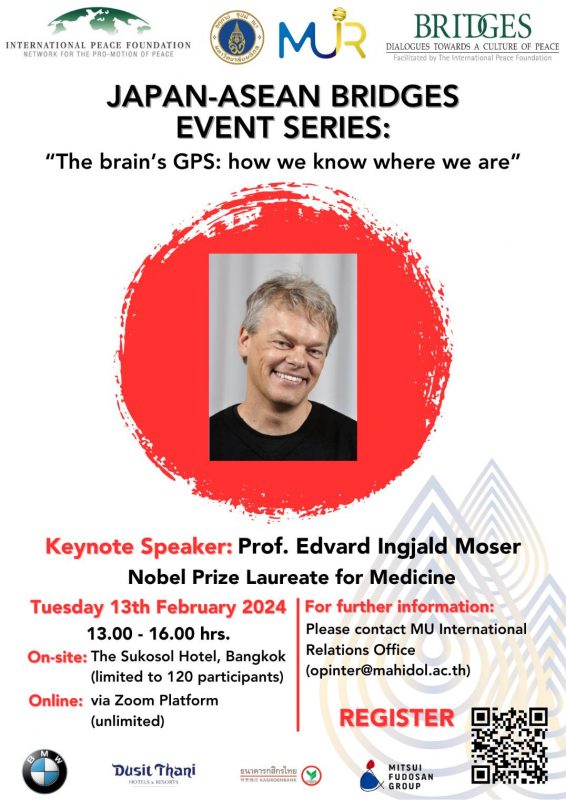JAPAN-ASEAN BRIDGES EVENT SERIES:
“The brain’s GPS: how we know where we are”
Keynote Speaker: Prof. Edvard Ingjald Moser, Nobel Laureate for Medicine
Join us for an engaging virtual meeting on 13 February 2024
from 2.00-4.00 PM via Zoom!
Click the link below to access the meeting
“We look forward to your participation!”
Topic: Mahidol University JAPAN-ASEAN BRIDGES EVENT SERIES
Time: Feb 13, 2024 (14:00-16:00 PM Bangkok)
Join Zoom Meeting
https://zoom.us/j/99962843060?pwd=UFU1WTZjMVUyTDhtQVhINUY4aGpPdz09
Meeting ID: 999 6284 3060
Passcode: 13022024
Mahidol University, in collaboration with the International Peace Foundation, will organize the JAPAN-ASEAN BRIDGES EVENT SERIES: “The brain’s GPS: how we know where we are.”
We cordially invite you to join these special events on a Hybrid Platform.
Keynote Speaker:
Prof. Edvard Ingjald Moser, Nobel Laureate for Medicine
Topic of keynote speech:
-
The brain’s GPS: How we know where we are
Abstract of keynote speech:
This lecture will focus on how the mammalian brain encodes space and time. Few brain functions are more critical to survival than the ability to organize space and time. Professor Moser will begin with the Nobel-awarded discoveries on space. The entorhinal cortex of the mammalian brain contains specialized position-coding cell types, including grid cells. Grid cells are active only when animals (and humans) are at certain locations, locations that tile environments in a periodic hexagonal pattern. Together with other specialized cell types in the entorhinal region, grid cells enable a dynamic GPS-like map of our own location in the environment. This location code is expressed at the neural population level, not in individual neurons, but in hundreds of neurons that work together, consistent with the idea that grid-cell activity is shaped by the intrinsic circuitry of the region rather than by any particular sensory inputs. In the second part of the lecture Professor Moser will switch to time and show how time can be inferred from the joint activity of cells in a different region of the entorhinal cortex, suggesting that this entire brain system is adapted for encoding both the wheres and the whens of experience, in agreement with the now common view that deficits in the function of the entorhinal system are at the core of neurological diseases where orientation in space and time is affected, such as in Alzheimer´s disease.
Program Details:
-
Date: Tuesday 13th February 2024
-
Time: 13:00-16:00 hrs. (UTC+7.00, Indochina Time)
-
Location: The Sukosol Hotel in Bangkok, Thailand (Limited number of participants: 120)
-
The Zoom platform (unlimited)
*Notes: the Zoom meeting URL will be provided to you through your registered email.
For further information:
Please contact MU International Relations Division
-
Ms. Khanittha Nimon
E-mail: khanittha.nim@mahidol.edu
-
Ms. Tassanaporn Hongyon
E-mail: opinter@mahidol.ac.th



